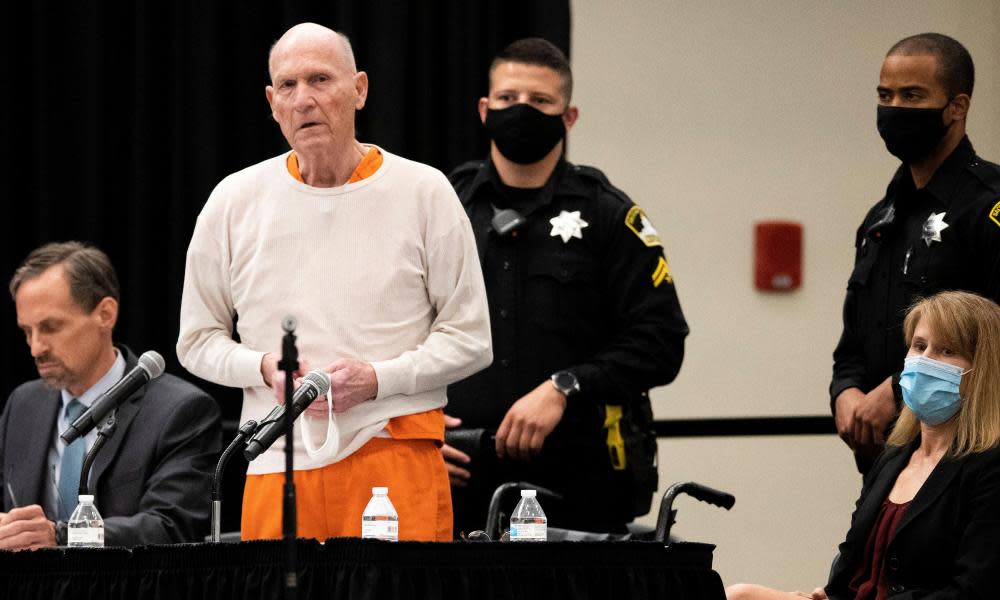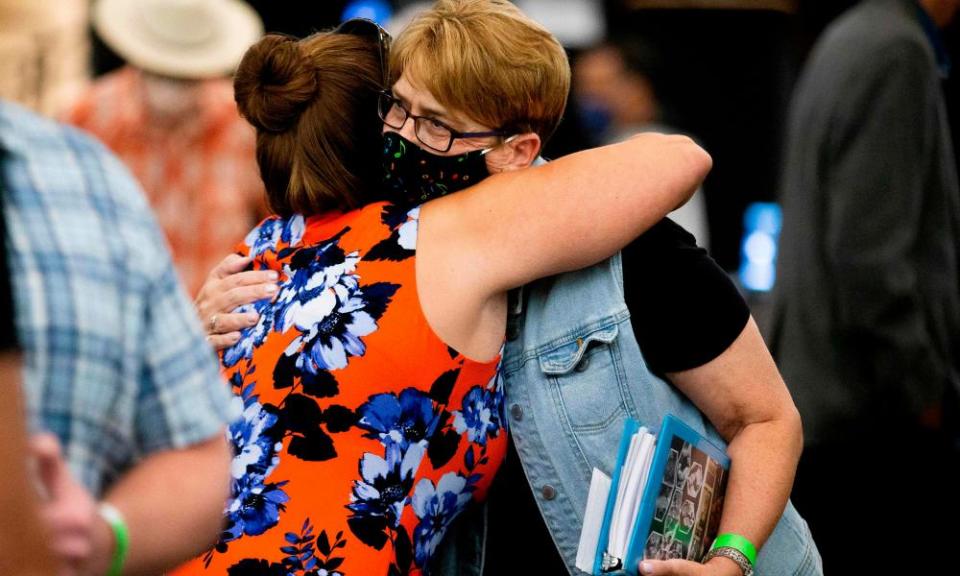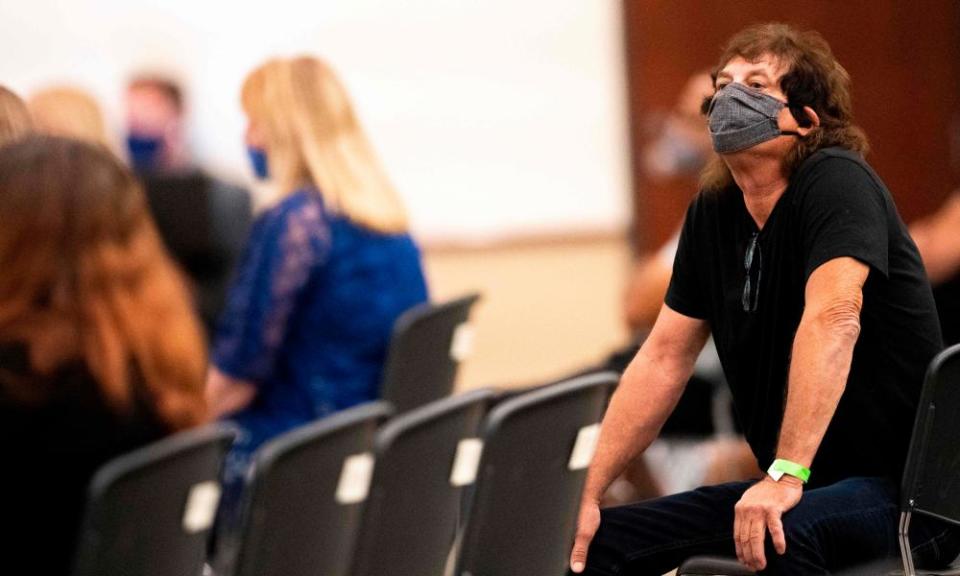Golden State Killer: Joseph DeAngelo sentenced to life in prison

Joseph James DeAngelo, better known as the Golden State Killer, has been sentenced to life in prison without the possibility of parole, four decades after he terrorized the suburbs of Sacramento and stalked neighborhoods in southern California, breaking into homes to rape and torture women and girls, and killing couples and young women in their beds.
His crimes left a trail of destruction that has haunted survivors and their families. The sentencing – which took place in Sacramento on Friday, on the 40th anniversary of two of the murders – follows three days of testimony from dozens of women and men who survived DeAngelo’s crimes, as well as family members of those who did not.
Judge Michael Bowman said he was “moved by all their courage, their grace, their strength.”
“All qualities you lack,” he said, addressing DeAngelo. “Are you capable of comprehending the pain and anguish you’ve caused?”
The defendant “deserves no mercy”, Bowman said before the sentencing, which was met with applause.
Those who had waited decades to confront DeAngelo finally got the chance to do so this week; they spoke of the destructive fear they have lived with since the attacks, the dread they felt before his arrest that he could one day return, and their efforts to reclaim their lives. They told DeAngelo, a man who had long remained a “faceless monster”, that he had been defeated.
“After your sentence, you will be a nobody. You are not worth any more of my family’s time,” said Ken Smith, the brother of Katie Maggiore, a newlywed who was murdered in 1978 along with her husband, Brian. “You can’t hurt anybody again.”
Related: Golden State Killer: survivors of Joseph DeAngelo's crimes speak out in court
The Friday sentencing was held in a ballroom at Sacramento State University, a venue large enough for socially distanced seating for all the survivors, family members, attorneys, law enforcement and media.
Inside, survivors and family members mingled with law enforcement officials who had worked for decades to solve the case. One woman wore a bedazzled shirt reading “Rot in hell.”
The room was quiet save for the sound of camera shutters clicking and tissues being pulled out of boxes as DeAngelo was escorted in a wheelchair to the front. He sat flanked between his attorneys and two sheriff’s deputies, wearing a face mask and a white sweater over his orange jumpsuit, staring down as the judge read the dozens of charges he had pleaded guilty to. It took the judge several minutes to read through the 13 murder charges, and 13 kidnapping-related charges. Family members wiped tears from their eyes as the judge read the names of their loved ones.
DeAngelo had spent most of the week’s hearings staring straight ahead, not speaking. But on Friday he addressed the court. There were gasps of surprise as he rose and took off his mask, giving a short statement.
“I’ve listened to all your statements, each one of them. And I am truly sorry to everyone I hurt,” he said.
The Golden State Killer, who was at various times dubbed the East Area Rapist and the Original Night Stalker, terrorized California during the 1970s and 80s. He remained one of America’s most notorious unidentified serial killers until law enforcement officers connected DeAngelo to the case using DNA in 2018. The 74-year-old former police officer pleaded guilty in June to 13 murders as well as 13 kidnapping-related charges, and he admitted to dozens of rapes in northern and central California between 1976 and 1979 that he could not be charged with due to the statute of limitations.

Law enforcement officials had spent more than 40 years trying to solve the case, which spanned 11 counties and had profound impact on the entire state, particularly in Sacramento, where gun and alarm sales soared during the peak of the attacks.
The crimes, and their long-unidentified perpetrator, drew particular interest from the true crime community and spawned dedicated discussion boards. I’ll Be Gone in the Dark, a bestselling book about the true-crime writer Michelle McNamara’s search for the Golden State Killer, brought wide attention to the case when it was released shortly before DeAngelo’s arrest, and it led to an HBO series. Some of the victims credited McNamara by name for her work on the case.
The week brought powerful moments as, one by one, women and men delivered testimony, looking directly at the man responsible. The sheer number of the survivors and family members indicated the scope of DeAngelo’s reign of terror. “He tormented me and told me over and over again he would kill me and I believed him,” said Kris Pedretti, who was 15 when DeAngelo broke into her home and raped her. “At three different times that night, I thought I was going to die.”
At some points even the judge wiped tears from his eyes as survivors and their families described, sometimes for nearly an hour, the lasting repercussions of the attacks: divorces, post-traumatic stress disorder and unshakable fear.
“I never felt safe for many years. I was always looking over my shoulder expecting someone to jump out at me,” said Patricia Murphy in a statement read by her daughter. “He punched me in the face and broke my nose. I had a concussion from falling backwards and hitting my head on the pavement … I did what I had to do to stay alive.”
Paul Holes, an investigator who helped to solve the case and worked on it for decades, described the week as one of raw emotions listening to survivors. “Today he’s sentenced, but it’s not a feeling of elation,” he said Friday. “The devastation he inflicted on everybody is still here. They got justice but they still have trauma that they have to deal with.”

Jennifer Carole described her father and stepmother, Lyman and Charlene Smith, who were killed by DeAngelo in 1980, as generous and vivacious. She described DeAngelo as the “epitome of white privilege”.
“Joe was not shoved or punched or even thrown to the ground when he was arrested. He was treated with dignity he didn’t deserve,” she said of his eventual apprehension by police in 2018. “Joe was a cop. He used those precious skills, designed to protect us from people like him, to commit heinous crimes.”
Related: 'I knew the victims' pain': the pioneering detective who took on the Golden State Killer
Courtney Strauss, the daughter of Debbie Strauss, an East Area Rapist victim who died of cancer in 2016, described how her mother always believed someone was watching her and got up several times a night to check the locks on the doors.
Debbie Strauss’s sister, Sandy James, showed a photo of Strauss to the court and demanded that DeAngelo look at it. He did not.
Still, having the chance to speak out after all these years was powerful, said Pedretti.
“I feel empowered – just being able to say it out loud and speak my truth,” she said. “I’m sure DeAngelo heard, whether [or not] he wants us to know. But it doesn’t matter because it was for us, not him.”
On Friday, the defense read statements from family members of DeAngelo, who expressed shock over learning who their brother and uncle were.
“I believed I knew my uncle and I am still shocked. I do not know the person who committed those crimes,” a statement from his niece read.
Carole said it made her sad for his family. “It spoke to Joe’s ability to actually be human and it makes me sad that he didn’t ever feel it. There’s people who love him.”
“Hate is easy. Compassion is hard,” she added.
Gay Hardwick, who was raped by DeAngelo when he broke into the home she shared with her now husband, Bob, said she felt vindicated seeing DeAngelo rise to speak, after months of him appearing weak and feeble in court.
“He’s a classic manipulator to the very end,” she said. “His statement didn’t carry any sincerity but it did reveal his voice which is clear and strong.”
She added that she tried to use her statement to show society still needs to change. “I would hope to move the ball forward in terms of how rape is viewed. Women still carry the burden and it doesn’t get placed where it belongs: on the shoulders of the perpetrator. It needs to be seen as torture.”
